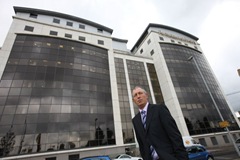Slow recovery but good opportunity
PwC Managing Partner Hugh Crossey anticipates a slow recovery but sees the recession as a chance to adopt better business models, as he discusses the economic situation with Owen McQuade.
By PricewaterhouseCoopers’ estimates, the pace of decline in the Northern Ireland economy has slowed markedly, but recovery is not yet in sight. A four per cent contraction is expected this year followed by a “very marginal” 0.5 per cent rate of growth in 2010, Hugh Crossey remarks.
“While many economists seem to agree that the recession has bottomed out, I think the reality for us, though, is that in Northern Ireland the recession is far from over and the legacy will live with us for a number of years.”
Unemployment, for example, will continue to rise and put pressure on the public sector’s welfare budget. For young graduates and school leavers, this is a particularly challenging time with most businesses either not recruiting new starts or significantly reducing their intake.
Crossey detects doubts among businesses about the way forward, with volatile exchange rates and a “pretty decimated” housing market. Both factors in turn are affecting business and consumer confidence.
Based on that assessment, he sees a slow recovery with the real signs of that appearing at least a year from now.
“Our view is that it’ll be a tough 2010 and probably 2011 before we see hard evidence of genuine recovery. I know people are talking about some green shoots and some movement in the housing market but, to be quite honest, the volume of transactions in that space is very limited indeed,” he contends.
“We see house prices beginning to stabilise, but it will be a very long time before you see average prices going back to 2006-2007 levels.”
Serious economic problems and rising unemployment in the Republic – up to around 15 per cent – will also impact on the North as it is the province’s largest export market outside the UK.
“Our view is it’s going to be a slow and difficult trading environment for the next 12 to 18 months.”
Two factors, in his view, mitigate against a speedy recovery. Businesses which have lost orders and have seen profits drop are reluctant to invest. In tandem, consumers are focused on job security and paying their mortgages, and are therefore reluctant to spend. The banks, he says, should “facilitate a recovery by lending more” but whether they are willing to lend at rates at which businesses and consumers are willing or able to borrow is an issue that will also influence the pace of recovery.
At the same time, he does see opportunities emerging in that time frame for businesses to adopt more efficient operating models which can then be used to accelerate growth as they enter recovery.
“Once you focus your mind on driving a more efficient business operating model, you will retain that model as you go forward. Organisations that have reacted to the current economic crisis by reengineering their business operating model to drive efficiencies will be in the best position to exploit opportunities in any recovery.”
Private sector strength
The discussion turns to why a strong private sector is important for an economy. While the question is a nonstarter elsewhere – and its answer selfevident – it must be asked in a Northern Ireland context given the local sector’s relatively small size.
“No modern economy can survive without a vibrant private sector,” he states. “That’s who creates the wealth in a nation so it’s vitally important.”
The scale of the public sector has “slightly protected” the province in past recessions – consequently Crossey anticipates the decline in local business activity will the lowest in the UK. However, for the same reason, recoveries tend to be slower here, lagging behind other regions. Hard choices will also inevitably be driven from Westminster.
“How long can Northern Ireland’s public sector continue to operate at current levels when it’s actually working off a growing deficit? Our view would be, no matter who wins the next general election in the UK, Northern Ireland’s going to come under pressure to reduce that deficit funding and therefore it’s essential to have a much more vibrant private sector that raises the tax take.”
Turning to how to develop that kind of economy, Crossey sees two key ingredients for success.
Firstly, he wants to see “much more cooperation” between the public and private sectors. Wholesale privatisation of public services would not be “the right answer” for the economy but he calls for more collaborative working, embracing partnerships models such as joint ventures. These are quite common in the rest of the UK – accelerated development zones being an example – but almost non-existent in Northern Ireland.
Secondly, there must a willingness to take more risks: “We have to get away from our risk-averse nature. And in Northern Ireland, that risk-aversion is almost as prevalent in the private sector as it is in the public sector.”
More imaginative methods of raising public finance and more innovation in the private sector are also needed, he adds. Selling off public sector assets is not the only way to raise capital; there are alternatives, such as leveraging assets to provide finance while still retaining them in public ownership.
“There are relatively few companies in Northern Ireland that are spending an appropriate amount on research and development and that needs to be fundamentally addressed,” he continues.
“Personally, I believe we need a much more export-orientated mindset. At the end of the day, in Northern Ireland there’s a limit to the size of the domestic market so you’ve got to get higher value products and services into new export markets. We need to do things to stimulate that and drive a much more export and innovative culture than we currently have.”
Many companies, he says, miss out because they do not partner with others in the private sector – that would make them more competitive in environments where they currently can’t compete as individual firms.
Some signs of this are already evident in the construction sector where larger players have come in and partnered with local construction companies to enter new and mutually profitable markets.
Austerity
The state of the Treasury’s finances shows that public spending will certainly not grow as much as before, with clear implications for Northern Ireland. Likewise, local politicians will face challenges when delivering the Programme for Government, which runs to 2011. Water charging and rates, he predicts, will come back onto the table.
“It’s going to force what will be seen as difficult choices. Historically, we’ve been able to run some populist policies, but as financial constraints in the public sector start to bite, our local politicians will inevitably have to make hard choices.”
 When it comes to preparing for recovery, he says the Executive should be more imaginative in bringing finance into the sector and also look at “different ways in which projects, whether infrastructure or service improvement, can actually be delivered.”
When it comes to preparing for recovery, he says the Executive should be more imaginative in bringing finance into the sector and also look at “different ways in which projects, whether infrastructure or service improvement, can actually be delivered.”
Initiatives by the devolved administrations in Scotland and Wales to embrace new fiscal structures and taxraising powers cannot be ignored and Crossey expects the future of the Barnett formula to rise up the political agenda. As for transferring tax powers to the Assembly, PwC sees this as an issue worthy of discussion.
“We certainly think that’s something worth considering, particularly when you look where Scotland has gone, and where Wales is headed. It seems strange that Northern Ireland would be the only devolved administration that would continue with an ‘as-is’ programme.”
Other measures he highlights include congestion charging and levies on city centre parking, already used elsewhere and which would both raise cash and encourage public transport usage.
For all the province’s issues, Crossey does see potential in its political and business environment.
“Northern Ireland, with its scale, has the opportunity to deliver real joined-up government and the Executive is in a position to deliver some innovative solutions which other parts of the UK would find very difficult, either because of the scale of the issue or the political demography.”
Describing the province as still a very good place to do business, he continues: “We can be competitive. Obviously, the exchange rate with the euro is working in our favour at the moment in terms of exporting so we need to try and exploit that and anything government can do to stimulate FDI [foreign direct investment] is bound to be beneficial to us.” Invest NI, Crossey suggests, could work better if given more freedom and flexibility.
PwC research at a national level also indicates that the citizen is becoming more demanding and more assertive – a further incentive for reform.
“If you accept that citizens are demanding higher levels of service delivery that will have to be delivered in the context of severe public expenditure constraints, the Executive will be forced to look at new business operating models. How to deliver more and better services for less expenditure is the key question facing the Executive. In our view, they’re also going to have to devise both more innovative ways of raising finance and new business operating models to deliver more for less. In the context of extremely difficult economic conditions, this is a major challenge”
Profile: Hugh Crossey
Hugh Crossey has spent over 25 years as an advisor to public and private sector organisations in the UK, Ireland and Europe and specialises in large public sector modernisation programmes. He has particular expertise in education, shared services, ICT infrastructure, finance and waste management.
He is currently working with a number of UK central and local government organisations to develop new and more efficient business operating models and examining innovative ways of funding major change management programmes.
Married with three sons, his interests outside PwC are family, travelling and sport, particularly soccer and rugby.
Hugh can be reached at: hugh.m.crossey@uk.pwc.com






